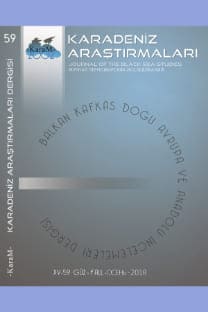Ağustos 2008 Savaşı Sonrasında Gürcistan Dış Politikası
Literatürde Güney Osetya Savaşı olarak da bilinen, Ağustos 2008'de Gürcistan ve Rusya Federasyonu arasında bir bölgesel savaşa dönüşen kısa süreli ancak önemli sonuçları olan askeri çatışma, Gürcistan için çeşitli açılardan tahrip edici olmuştur. Ekonomi, sosyal hayat, iç politika vb. yanında Rusya’nın müdahalesi ve Tiflis'in mağlubiyeti, Gürcistan'ın 2004'ten itibaren izlediği Batı yönelimli dış politikanın seyrine ilişkin de şüpheler ortaya çıkarmıştır. Çalışmada, Saakaşvili yönetiminin 2008 sonrasında izlediği dış politika, bölgesel ve küresel ölçekte incelenmektedir. Bu bağlamda, ABD’nin bölgede izlediği siyaset, Gürcistan’ın birinci ve ikinci halka komşuları ile ilişkileri yanında, Gürcistan’daki iç siyasal dinamikler de araştırma konularına dahil edilmiştir.
Anahtar Kelimeler:
Gürcistan, Kafkaslar, 2008 Savaşı, Güney Osetya, Abhazya
GEORGIAN FOREIGN POLICY AFTER THE AUGUST 2008 WAR
The Military Conflict that widely known as South Ossetia War in the literature and which turned to a short term regional war but with important results, had been harmful for Georgia from various aspects. Besides economy, social life, domestic politics etc., Russia’s intervention and defeat of Tbilisi revealed doubts over Georgia’s West oriented foreign policy since 2004. Within this work, foreign policy followed by Saakashvili government since 2008 is investigated both regional and global dimensions. Within this context, besides the issues like US foreign policy towards the region and Georgia’s relations with its first and second circle neighbours, the domestic political dynamics were included in the research subjects as well.
Keywords:
Georgia, Caucasus, 2008 War, South Ossetia, Abkhazia,
___
- ASMUS, Ronald D. A Little War that Shook the World: Georgia, Russia, and the Future of the West, Houndmills: Palgrave Macmillan, 2010, p.119‐ 120.
- GRDZELIDZE, Tamara, The Orthodox Church of Georgia: Challenges Under Democracy and Freedom (1990–2009), International Journal for the Study of the Christian Church, Vol. 10, No. 2–3, May‐August 2010, 160‐ 175.
- KANBOLAT, Hasan, “Gürcistan Elindeki Türk Gemilerini Bırakıyor”, http://www.orsam.org.tr/tr/yazigoster.aspx?ID=1354, 27 December
- KOOLAEE, Elaheh and HAFEZIAN, Mohammad Hossein, “The Islamic Re‐ public of Iran and the South Caucasus Republics”, Iranian Studies, Vol. 43, No.3, June 2010, 391‐409.
- MIKHELIDZE, Nona, “After the 2008 Russia‐Georgia War: Implications for the Wider Caucasus”, The International Spectator, Vol.44, No.3, Sep‐ tember 2009, 27‐42.
- PAPAVA, Vladimer, “Georgia's economy: Post‐revolutionary Development and Post‐war Difficulties”, Central Asian Survey, Vol.28. No.2, 199‐213.
- SWANSTRÖM, Niklas, “Georgia: The split that split the SCO”, CACI (Central Asia‐Caucasus Institute) 09/03/2008, http://www.cacianalyst.org/?‐ q=node/4930
- TRUSCOTT, Peter, “The Fourth Energy Corridor: The Three Phases of Nabucco”, Whitehall Papers, 73:1, 2009, 32‐46.
- TURNER, Susan, “China and Russia After the Russian‐Georgian War”, Com‐ parative Strategy, Vol.30, No.1, 50‐59.
- AP, “Iran, Georgia Strike Gas Deal Amid Crisis,” China Daily, 13 November 2009, tent_516251.htm
- “Armenia: Saakashvili Visit to Yerevan Produces Lots of Smiles, Little Ac‐ tion”, http://www.eurasianet.org/departments/insightb/artic‐les/ea‐ v062609a.shtml, 25 June 2009
- “Georgia Cuts Off Russian Military Transit to Armenia”, http://asba‐ rez.com/95256/georgia‐cuts‐off‐russian‐military‐transit‐to‐armenia/ 19 April 2011
- Georgia: The Javakheti Region’s Integration Challenges, International Crisis Group, Europe Briefing No.63, 23 May 2011.
- Georgia and Russia:Clashing over Abkhazia, International Crisis Group, Eu‐ rope Report No. 193, 5 June 2008. http://www.armenianweekly.com/2010/10/05/georgian‐fm‐there‐is‐no‐ javakhk‐on‐the‐map/, 5 October 2010.
- “News Media Feel Limits to Georgia’s Democracy”, The New York Times, 7 October 2008, http://www.nytimes.com.
- “Russia, Ukraine agree on naval‐base‐for‐gas deal”21April 2010, By Ivan Watson and Maxim Tkachenko, CNN. “Deal Struck on Gas, Black Sea Fleet”, 22 April 2010, By Anatoly Medetsky, The Moscow Times.
- South Ossetia: The Burden of Recognition, International Crisis Group, Europe Report No. 205, 7 June 2010.
- “US State Department and Javakhk: The WikiLeaks Cables Part I”, http://asbarez.com/98039/us‐state‐department‐and‐javakhk‐the‐ wikileaks‐cables‐part‐i/, 9 September 2011.
- “Upper Lars Border Checkpoint Opens For Russian Citizens”, http://www.armtown.com/news/en/trt/20110702/153556/, 2 July
- ISSN: 2536-5126
- Yayın Aralığı: Yılda 4 Sayı
- Başlangıç: 2004
- Yayıncı: Osman Karatay
